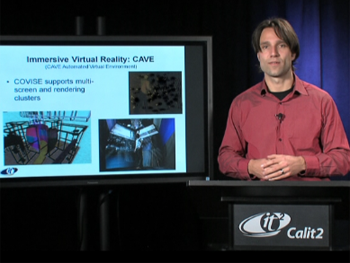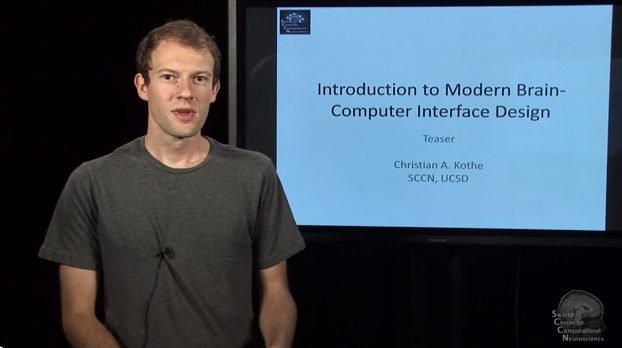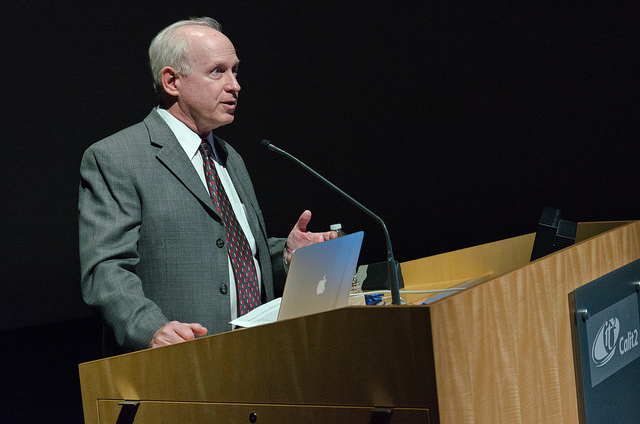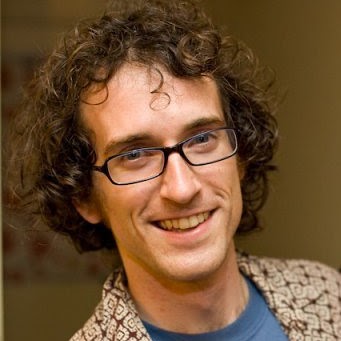Qualcomm Institute Experiments with New Models for Blended and Online Courses
San Diego, April 16, 2014 -- In 2013, Qualcomm Institute director Ramesh Rao extended an offer to provide support for development of as many as 10 massive open online courses (MOOCs) – especially those experimenting with different types of online course production and delivery. So far, the institute has supported production of six MOOCs, and its Technology Enhanced Learning (TEL) Initiative is organizing a workshop panel with UC San Diego faculty who are in the vanguard of efforts to bring online into the classroom, and vice versa. The planned May 30 workshop is co-organized by the UC San Diego Education Initiative, and it will take place in Atkinson Hall's Calit2 Auditorium.
|
To date, the Qualcomm Institute has supported six MOOC projects, leveraging prior investments by the institute in facilities, equipment and personnel critical to the production of online courses (see resource roundup in box below).
Bioinformatics MOOC ranked #1
Computer Science and Engineering professor Pavel Pevzner was the driving force behind the most successful UC San Diego MOOC to date. Distributed over the Coursera network, Bioinformatics Algorithms (Part 1) enrolled more than 32,200 students in Fall 2013. As students were submitting their final coursework, CourseTalk – which tracks user reviews and ratings for MOOCs – reported that as of late February, Pevzner’s course ranked #1 in the world among roughly 400 online courses with ratings. The ranking was based on the course's five-star ranking, and superlative reviews that averaged 4.9 out of 5 points, as well as recency.
The Qualcomm Institute co-sponsored the course, which was primarily recorded in the HD Studio (including the teaser for the Coursera course for which Pevzner dressed up like a cowboy to stress why students should consider joining him on the bioinformatics frontier). Co-instructor Phillip Compeau, Pevzner and a development team spent much of the previous year developing an e-textbook and the Rosalind system to help students work through key problems in bioinformatics.
Among key metrics: students watched over 300,000 videos; 1,500 students participated in discussion forums; and they contributed to 1,187 discussion threads with 4,632 posts, 3,926 comments on posts, and 6,858 votes. In the end, roughly 600 students passed the course, and one-third of them received a distinction. “It was quite an achievement for that many students to pass a very difficult course,” says instructor Phillip Compeau.
|
Feedback and lessons learned from the course will allow Pevzner and Compeau to make changes in the course before it is offered again in Fall 2014. After that, they will take what they learned and use the knowledge when they develop Part 2 in the Bioinformatics Algorithms series, which Pevzner hopes to offer for the first time in 2015.
Google supports course in biofuels
Nearing completion (with one last video recording in the Qualcomm Institute this week) is a high-profile MOOC – Introduction to Biofuels – developed by UC San Diego biology professor Stephen Mayfield. The director of the San Diego Center for Algae Biotechnology received a $50,000 grant from Google to create a MOOC in the field of sustainable energy, food and fuel. “We are excited about this opportunity and believe it will help to educate a larger sector of society on the challenges we face in our energy future,” Mayfield said in testimony at an Assembly hearing in Sacramento. “It will also allow us to highlight the scientific discovery that will enable us to meet these grand challenges.” Funding for development of the MOOC also came from UC San Diego’s multidisciplinary Food & Fuel for the 21st Century (FF21) research center, and its Center for Energy Research. FF21 program coordinator Travis Johnson helped produce the course.
|
“We launched a test run with the first 12 lectures last month and are now going through the feedback we got from participants,” says Mayfield. “We will launch the full MOOC on Coursera in May, again as a test run, but with all 34 lectures and exam and feedback – the whole shooting match.” If all goes well, Mayfield will also use some of the lectures in the biofuels course he is teaching this spring in the classroom. He is also working with Google: “They will be helping us make it a little more interactive, which as you know is the hard part to do with a MOOC.”
By next fall, the MOOC should be ready to launch as a full online, 3-unit course through UC San Diego Extension. It would be the first required course to be taken at the beginning of two certificate programs: in Biofuels Processes; and in Biofuels Science.
|
Working with the Swartz Center for Computational Neurosciences (SCCN), the Qualcomm Institute produced a course for Calit2ube, its own YouTube channel. It serves as a primer on brain-computer interfaces (BCI) for UCSD students and online learners who may not yet have hands-on experience with the latest EEG hardware and software used in brain research. The 10-class course, Introduction to Modern Brain-Computer Interface Design, generated nearly 13,000 views in its first six months online. The full course consists of 65 videos, including lecture sequences, demos, overviews and exercises – all recorded and edited in the institute’s HD Production Facility. The course was overseen by SCCN director Scott Makeig but developed and taught by Christian Kothe (pictured), also from the Swartz Center. In the course, Kothe takes students through a Matlab toolbox he developed, called BCILAB, for building and using BCI models. The series also introduces applications to EEG cognitive interfaces. BCILAB interconnects with EEGLAB, the Swartz Center's software environment for electrophysiological data analysis that is now used in many labs around the world. Kothe is paying particular attention to making BCILAB comprehensive and as easy to use as possible, and the MOOC is part of that effort.
|
The Qualcomm Institute also stands ready to support the needs of faculty who need to supplement other resources for video and MOOC production on campus. For example, in Summer 2013, QI’s Rao provided support to UC San Diego urban studies and planning professor Keith Pezzoli. Pezzoli was the lead organizer behind an online course titled, Doing Civically-Engaged Research: Theory, Tools, Method and Ethics. While most of the online components of the course were shot free of charge in the campus studio run by Academic Computing & Media Services (ACMS), for scheduling purposes, some of the video lectures were captured in QI’s HD Studio. Rao agreed to support half the cost of using the studio, up to a maximum of $1,300 in studio and personnel costs.
|
Pezzoli’s MOOC leveraged a summer Faculty Workshop on Online and Blended Learning chaired by Social Sciences dean Jeff Elman and co-organized by Deborah Forster of the Qualcomm Institute’s Technology-Enhanced Learning (TEL) Initiative, Academic Computing and Media Services (ACMS), and the UC San Diego Education Initiative. The 7-week workshop was designed primarily for faculty and researchers who wanted to get hands-on experience with the development of a MOOC from the ground up. Many of the materials for Pezzoli’s MOOC were generated by faculty and community scholars who participated in the summer workshop. Attendees also continued to interact – in person and online – into 2014.
One of those attendees – Elizabeth Losh, who runs the Culture, Art & Technology (CAT) program in UCSD’s Sixth College – led development of a November 2013 proposal to the UC Innovative Learning Technology Initiative (ILTI). Submitted jointly by UC San Diego with UC Santa Barbara, UC Irvine and UC Davis, the proposal was successful, and ILTI committed nearly $100,000 in grant funding for the creation of instructional videos to be used online and in the classroom (at UC San Diego, as the upper-division CAT 125 course on Public Rhetoric and Practical Communication).
|
With Lisa Nakamura, Losh is also co-directing FemTechNet, an international effort to promote imaginative MOOC alternatives, such as the model of a DOCC (Distributed Open Collaborative Course), which has been honored by the MacArthur Foundation’s Reclaim Open Learning Challenge. Losh and UC San Diego’s Lisa Cartwright are currently co-teaching a DOCC course, Dialogues on Feminism and Technology, which combines video dialogues (in which multiple scholars explore a topic) and live classroom instruction.
Taking the online revolution offline
Two other key participants in the Summer 2013 faculty workshop, co-sponsored by QI’s TEL Initiative, were Cognitive Science Ph.D. students Jamie Alexandre and Richard Tibbles, co-facilitator for the workshop. Alexandre and Tibbles co-founded the Foundation for Learning Equality (FLE) in March 2013. The non-profit, which aims to give everyone the ability to achieve a quality basic education, specifically targets the estimated 4.5 billion people who still lack Internet access (who also happen to live in countries with the poorest educational systems).
|
Related Links
Bioinformatics Algorithms (Part 1)
Introduction to Biofuels
Technology Enhanced Learning (TEL) Initiative
CAT 125B Public Rhetoric and Practical Communication
Doing Civically Engaged Research: Theory, Tools, Methods and Ethics
FemTechNet
Foundation for Learning Equality
KA Lite
Reclaim Open Learning
Academic Computing & Media Services
Online Course Developed in Computer Science and Engineering Ranks No. 1
Calit2's Qualcomm Institute
Media Contacts
Doug Ramsey, 858-822-5825, dramsey@ucsd.edu








